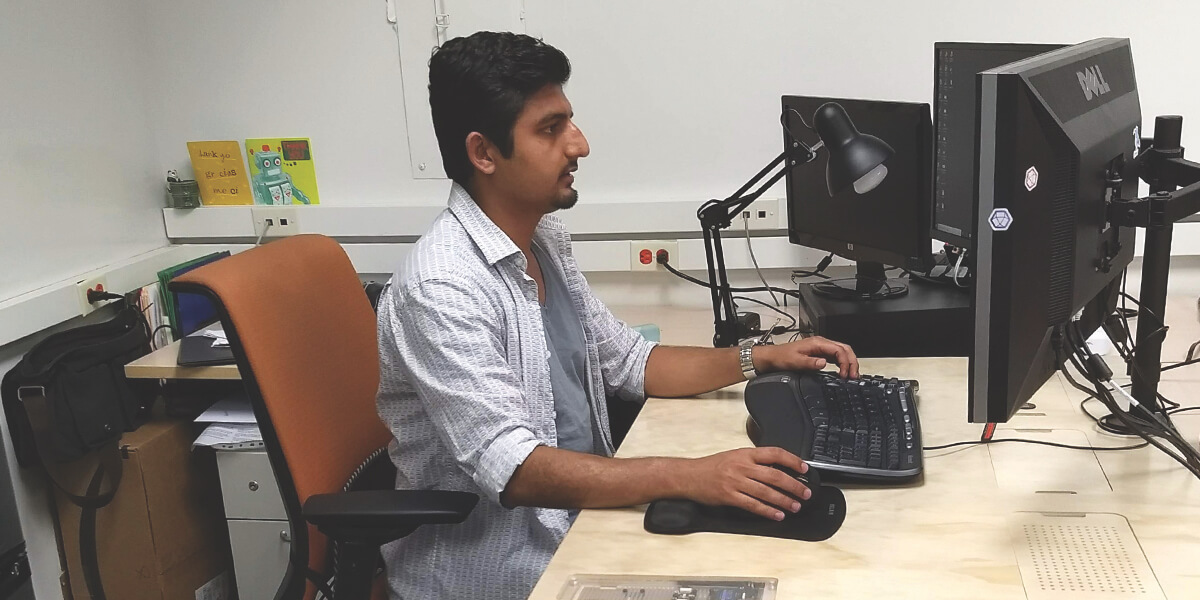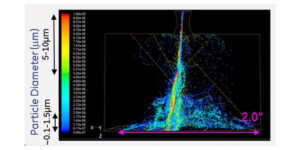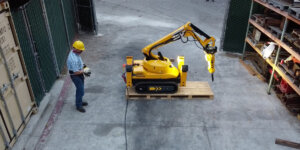
USC Viterbi Ph.D. student Ashrant Aryal working at a smart desk prototype. (Photo/Courtesy of Ashrant Aryal)
How much more satisfied would you be if your desk could automatically adjust the indoor environment, including temperature, lighting, and even the desk and chair height, to your preferences? How much healthier would you be if your desk could automatically adjust these parameters to the best practices?
Burcin Becerik-Gerber, an associate professor in the Sonny Astani Department of Civil and Environmental Engineering, and her team of researchers are working to make such desks a reality in the near future.
As envisioned, the desk would collect data from the user through strategically placed sensors that measure temperature, light intensity, humidity, air speed around the desk, as well as the user’s head, neck, arm positions, skin temperature, heart rate while also monitoring squinting, hunching, and so on. After about a week, not only could the desk predict the user’s preferred settings for thermal, visual and postural comfort, but it might be able to suggest what would be best for maximizing their health and productivity.
“Our goals for this project are to assume improved postures, increase thermal comfort range, decrease continuous sitting time, and to provide a dynamic lighting environment that supports human circadian rhythm and reduces discomfort,” said Becerik-Gerber, USC Viterbi’s Stephen Schrank Early Career Chair in Civil and Environmental Engineering. “This smart desk will impact millions of office workers and the workplace by changing the way we interact with regular objects in everyday life. It will continuously learn and negotiate around the bounds of users’ comfort, adaptively and over time.”

Burcin Becerik-Gerber (Photo/USC Viterbi)
Over the past few years, Becerik-Gerber and her team have made huge strides. Along with her industry collaborator Arup – a global engineering and design firm and the original developers of the smart desk – the team has created three versions, all of which incorporate different features such as light intensity sensors, personal heating and cooling remedies, and even thermal cameras that can monitor a user’s thermal comfort.
Francesco Anselmo, the lead researcher from Arup said: “Long-term, we imagine that the technology embedded in the desk will help creating the workplace of the future. The sensing and user interface systems we have developed will redefine our experience with buildings, contributing to improve individual and societal productivity and creating healthier environments that promote well-being.
Recently, the project received a nearly $700,000 grant from the National Science Foundation. The new grant will help the researchers explore the next version of the smart desk. In this effort, they will also benefit from the expertise of two additional members of the USC faculty: Gale Lucas, a research assistant professor in the USC Institute of Creative Technologies, and Shawn Roll, director of the Ph.D. program in Occupational Science Program.
Research team member Ashrant Aryal, a current Ph.D. student in civil engineering, said the smart desks could have a real impact.
“I believe that our research has a lot of value in the real world,” Aryal said. “It won’t be just research that stays as an academic paper.”
Looking forward, Becerik-Gerber said she expects big things from her smart desk.
“The goal is definitely to commercialize this workstation,” Becerik-Gerber said. “We envision an unprecedented intelligent workplace – one that can co-evolve with its users to bring their preferences in line with the healthiest practices. We expect this system will represent an apparent advance in the ability for intelligent machines to collaborate with their users.”
Published on September 16th, 2018
Last updated on May 17th, 2022











